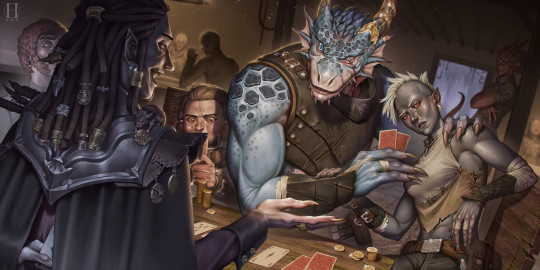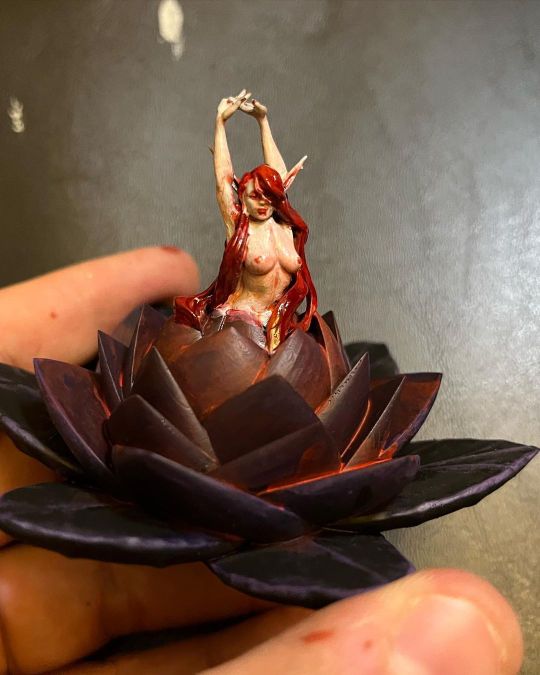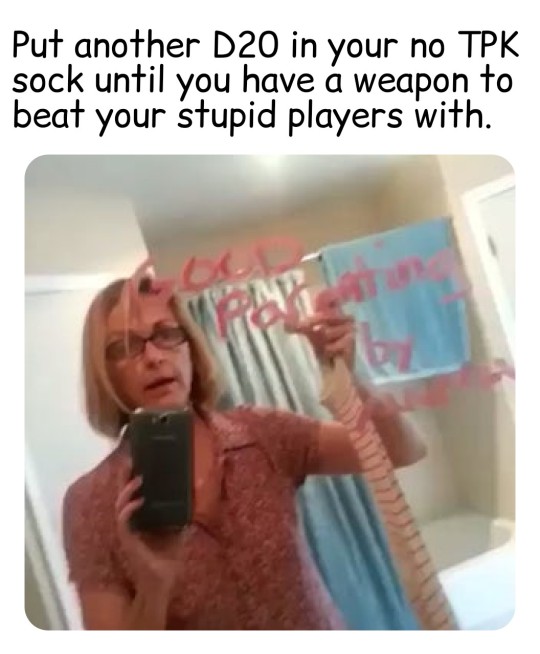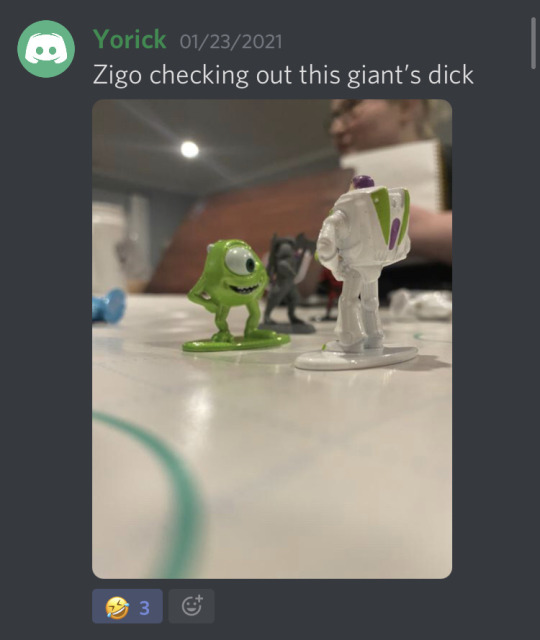#dungeonmaster problems
Text
This week on curse of strahd:
The leading theory is that the Abbott is an aberration. At least, that's what Ireena reckons. She had the convincing argument that he had to be an elemental, celestial, aberration, fey, fiend, or undead. He didn't seem like an undead, they know those pretty well by now. He doesn't seem like an elemental or fey. Of the remaining options, aberration goes pretty well with the fleshcrafting theme.
They did briefly throw around the idea of getting Ireena to bat her eyes at Strahd and tell him "Hey, there's this guy in the abbey who might rival you in power, maybe kill him?" and letting nature take its course.
They also have literally every sign that the next artifact is Sergei's sword and it is in the abbey's nursery. (Which, it is.)
I may have been a bit of a mean DM here, though: They saw Sergei's sword before it was broken, in a vision of Tatyana's death where she grabbed for the sword before taking her fatal fall. So they know it had a very distinctive crystal blade. (Sergei's spirit did hint that he wasn't sure of the sword's condition and that Strahd is very good at breaking things.)
Which means they are now looking, very specifically, for a crystal sword. A sword, with a blade, made out of crystal. That sword.
It's gonna be really fucking funny if I send them off on a wild goose chase into the mists or up to the amber temple or something because they used arcane eye, saw the nursery was full of rubble, and were like "WELP GUESS IT ISN'T HERE".
...guess time will tell.
#curse of strahd#dungeons and dragons#dungeons and/or dragons#sunsword#dnd#dungeonmaster problems#oh my players
8 notes
·
View notes
Text

Dm Tip: Playing the Villain/ Guidelines for "Evil" Campaigns
I've never liked the idea of running an evil game, despite how often I've had people in my inbox asking how I'd go about it. I'm all about that zero-to-hero heroic fantasy not only because I'm a goodie twoshoes IRL but because the narrative-gameplay premise that d&d is built around falls apart if the party is a bunch of killhappy murder hobos. Not only would I get bored narrating such a game and indulging the sort of players who demands the freedom to kill and torture at will (I've had those before and they don't get invited back to my table), but the whole conceit of a party falls through when the obviously villainous player characters face their first real decision point and attempt to kill eachother because cooperation is a thing that goodguys do.
Then I realized I was going about it all wrong.
The problem was I had started out playing d&d with assholes, those "murder and torture" clowns who wanted to play grand-theft-auto in the worlds I'd created and ignore the story in favour of seeing how much unchallenged chaos they could create. They set my expectations for what an evil campaign was, and I spent the rest of my time developing as a dungeonmaster thinking " I Don't want any part of that"
But what would an evil campaign look like for my playgroup of emotionally healthy friends who understand character nuance? What would I need to change about the fundamental conceit of d&d adventures to refocus the game on the badguys while still following a similar enough narrative-gameplay premise to a hero game? How do we make that sort of game relatable? What sort of power/play fantasy can we indulge in without going off the deepend?
TLDR: In an evil campaign your players aren't playing the villains, they're the MINIONS, they're mooks, henchmen, goons, lackeys. They're the disposable underlings of uncaring overseers who have nothing but ill intent towards them and the world at large.
Where as in a hero game the party is given the freedom to challenge and overthrow corrupt systems, in an evil game the party is suck as part of that corrupt system, forced to bend and compromise and sacrifice in order to survive. The fantasy is one of escaping that corrupt system, of biding your time just long enough to find an opening, find the right leverage, then tossing a molitov behind you on the way out.
Fundamentally it's the fantasy of escaping a shitty job by bringing the whole company down and punching your asshole boss in the face for good measure.
Below the cut I'm going to get into more nuance about how to build these kinds of narratives, also feel free to check out my evil party tag for campaigns and adventures that fit with the theme.
Designing a campaign made to be played from the perspective of the badguys requires you to take a different angle on quest and narrative design. It’s not so simple as swapping out the traditionally good team for the traditionally bad team and vis versa, having your party cut through a dungeon filled with against angel worshiping holyfolk in place of demon worshipping cultists etc.
Instead, the primary villain of the first arc of the campaign should be your party’s boss. Not their direct overseer mind you, more CEO compared to the middle managers your party will be dealing with for the first leg of their journey. We should know a bit about that boss villain’s goals and a few hints at their motivation, enough for the party to understand that their actions are directly contributing to that inevitable doom.
“Gee, everyone knows lord Heldred swore revenge after being banished from the king’s council for dabbling in dark magic. I don’t know WHY he has us searching for these buried ancient tablets, but I bet it’s not good”
Next, you need a manager, someone who’s a part of the evil organization that the party directly interfaces with. The manager should have something over the party, whether it be threats of force, blackmail, economic dependency… anything that keeps the antiheroes on the manager’s leash. Whether you make your manager an obvious asshole or manipulative charmer, its important to maintain this power imbalance: The party arn’t going to be rewarded when the boss-villain’s plan goes off, the manager is, but the manager’s usefulness to the boss-villain is contingent on the work they’re getting the party to do. This tension puts us on a collison course to our first big narrative beat: do the party get tired of the manager’s abuse and run away? Do they kill the manager and get the attention of the upper ranks of the villainous organization? Do they work really hard at their jobs despite the obvious warning signs and outlive their usefulness? Do they upstage their manager and end up getting promoted, becoming rivals for the boss-villain’s favor?
Building this tension up and then seeing how it breaks makes for a great first arc, as it lets your party determine among themselves when enough is enough, and set their goals for what bettering the situation looks like.
As for designing those adventures, you’ll doubtlessly realize that since the party arn’t playing heroes you’ll need to change how the setup, conflict, and payoff work. They’re still protagonists, we want them to succeed after all, but we want to hammer home that they’re doing bad things without expecting them to jump directly to warcrimes.
Up to no good: The basic building block of any evil campaign, our party need to do something skullduggerous without alerting the authorities. This of course is going to be easier said than done, especially when the task spins out of control or proves far more daunting than first expected. The best the party can hope for is to make a distraction and then escape in the chaos, but it will very likely end with them being pursued in some manner (bounties, hunters, vengeful npcs and the like). Use this setup early in a campaign so you have an external force gunning for your party during the remainder of their adventures.
Dog eat dog: It’s sort of cheating to excuse your party’s villainous actions by having them go up against another villain who happens to be worse than they are. The trick is that we’re not going after this secondary group of outlaws because they’re bad, we’re doing it because they’ve either got something the boss wants, or they’re edging in on the boss’s turf. This sort of plotline sees the party disrupting or taking advantage of a rival’s operation, then taking over that operation and risking becoming just as villainous as that rival happened to be. This can also be combined with an “Up to no good” plot where both groups of miscreants need to step carefully without alerting an outside threat.
The lesser evil: This kind of plot sees your party sent out to deal with an antagonistic force that’s a threat not only to the boss’s plans but to everyone in general. In doing so they might end up fighting alongside some heroes, or accidentally doing good in the long run. This not only gives your party a taste of heroism, but gives them something in their back pocket that could be used to challenge the boss-villain in the future.
The double cross: In order to get what they want, the party need to “play along” with a traditional heroic narrative long enough to get their goal and then ditch. You have them play along specifically so they can get a taste of what life would be like if they weren't bastards, as well as to make friends with the NPCs inevitably going to betray. This is to make it hurt when you have the manager yank the leash and force the party to decide between finishing the job , or risk striking out on their own and playing hero in the short term while having just made a long term enemy. This is sort of plot is best used an adventure or two into the campaign, as the party will have already committed some villainous deeds that one good act can’t blot out.
Next, lets talk about the sort of scenarios you should be looking to avoid when writing an evil campaign:
Around the time I started playing d&d there was this trend of obtusely binary morality systems in videogames which claimed to offer choice but really only existed to let the player chose between the power fantasy of being traditionally virtuous or the power fantasy of being an edgy rebel. Early examples included:
Do you want to steal food from disaster victims? in Infamous
Do you as a space cop assault a reporter who’s being kind of annoying to you? in Mass Effect
Do you blow up an entire town of innocent people for the lols? in Fallout (no seriously check out hbomberguy’s teardowm on fallout 3’s morality system and how critics at the time ate it up)
I think these games, along with the generational backwash of 90s “edge” and 00s “grit” coloured a lot of people's expectations ( including mine) about what a "villain as protagonist" sort of narrative might look like. They're childish exaggerations, devoid of substance, made even worse by how blithely their narratives treat them.
Burn down an inn full of people is not a good quest objective for an evil party, because it forces the characters to reach cartoonish levels of villainy which dissociates them from their players. Force all the villagers into the inn so we can lock them inside and do our job uninterrupted lets the party be bad, but in a way that the players can see the reason behind it and stay synced up with their characters. The latter option also provides a great setup for when the party's actually monstrous overseer sets the inn on fire to get rid of any witnesses after the job is done. Now the party (and their players) are faced with a moral quandary, will they let themselves be accessories to a massacre or risk incurring their manager's wrath? Rather than jumping face first into cackling cruelty, these sorts of quandaries have them dance along the knife's edge between grim practicality and dangerous uncertainly; It brings the player and character closer together.
Finally, lets talk about ending the villain arc:
I don't think you can play a whole evil campaign. Both because the escalation required is narratively unsustainable, but also because the most interesting aspect of playing badguys is the breaking point. Just like heroes inevitably having doubts about whether or not they're doing the right thing, there's only so long that a group of antiheroes can go along KNOWING they're doing the wrong thing before they put their feet down and say "I'm out". I think you plan a evil campaign up until a specific "there's no coming back from this" storybeat, IE letting the Inn burn... whether or not the party allows it to happen, it's the lowest point the narrative will allow them to reach before they either fight back or allow themselves to be subsumed. If they rebel, you play out the rest of the arc dismantling the machine they helped to build, taking joy in its righteous destruction. If they keep going along, show them what they get for being cogs: inevitably betrayed, sacrificed, or used as canon fodder when the real heroes step in to do their jobs for them.
Art
#dm tip#dm tips#writing advice#evil party#drafting the adventure#dnd#d&d#dungeons and dragons#blades in the dark#ttprg#pathfinder
409 notes
·
View notes
Text
BBC Merlin is a DnD game.
Merlin is the dungeonmaster.
All the other players can be whatever you want them to be. Arthur is most likely a paladin. He's not entirely sure how to play the game in the beginning, but the more he gets into it, the more he opens up.
One day, as they all play a bit drunkly, Arthur takes an example of Gwaine, who is the bard and tries to sleep with literally EVERYTHING. Arthur lets loose and plays to those rules.
The problem is, Merlin is the one playing each and every character they interact with. So, whenever Arthur flirts with another character, Merlin is the one responding. And Arthur, who already has been fighting with his crush on the guy, falls deeper and deeper for him during the game.
84 notes
·
View notes
Photo

After the barbarian enviably and fearlessly jumps down the well he finds that inside is a cave system filled with a secret town of underdwellers. The only problem is something has slaughtered them all causing the water source to be flooded with blood. . . 💦🩸🟤 Mucky Water Quest . . #Dnd #dndtable #voxmachina #roleplayingames #dungeonsanddragons5e #tabletoproleplaying #fantasyquestboard #pathfinderrpg #dndencounters #dungeonmastersguild #criticalrole #ttrpg #dndencounter @dndwizards #wotc #dnd5ed #dnd5e #dndhomebrew #wizardsofthecoast #dungeonsanddragons #roleplaying #pathfinder #dungeonmasters #roleplayinggame #dungeonmastertips #tabletoprpg #role20 #roleplayinggames #dungeonmaster #dndcharacter (at Cincinnati) https://www.instagram.com/p/Ci_lLeeM6t2/?igshid=NGJjMDIxMWI=
#dnd#dndtable#voxmachina#roleplayingames#dungeonsanddragons5e#tabletoproleplaying#fantasyquestboard#pathfinderrpg#dndencounters#dungeonmastersguild#criticalrole#ttrpg#dndencounter#wotc#dnd5ed#dnd5e#dndhomebrew#wizardsofthecoast#dungeonsanddragons#roleplaying#pathfinder#dungeonmasters#roleplayinggame#dungeonmastertips#tabletoprpg#role20#roleplayinggames#dungeonmaster#dndcharacter
2 notes
·
View notes
Photo

Completed Kesiandra the alraunes of Aprax are great repositories of knowledge being that they are functionally immortal and even gain the knowledge of their direct parents (what they had at the time) as generations go on the gene memory gets fuzzy. The main problem for most people is not many exist and those that do are almost exclusively in deep Aprax feeding off of creatures and necrotic energy. Mini from @epicminiatures_patreon #dungeonsanddragons #dungeonsanddragonscharacter #dungeonsanddragonsminiatures #dungeonsanddragonsminis #dungeonmaster #dungeonmasterlife #fantasyminiatures #fantasyminis #epicminiatures #pacificnerdwest (at Tacoma, Washington) https://www.instagram.com/p/Cec97NROi_Z/?igshid=NGJjMDIxMWI=
#dungeonsanddragons#dungeonsanddragonscharacter#dungeonsanddragonsminiatures#dungeonsanddragonsminis#dungeonmaster#dungeonmasterlife#fantasyminiatures#fantasyminis#epicminiatures#pacificnerdwest
0 notes
Text
tfw you're overthinking it
#dnd#animation#dnd memes#dnd meme#dnd5e art#ttrpg#michelle zhuli#funny#dungeons and dragons#dungeonmaster#dming#dm problems#dnd 5e#joke credit to#alysshawke
179 notes
·
View notes
Text

#dungeons and dragons#dnd#dungeon master#dungeons and memes#funny dnd#dungeonmaster#dungeon master problems#funny dungeons and dragons#ttrpg memes#ttrpg#dnd player
18 notes
·
View notes
Text

You’re your worst critic
#dnd#dnd shenanigans#d&d#dnd campaign#d&d ideas#d&d shenanigans#dm life#dm#dungeonmaster#dungeon and dragons#dungeon master problems#d&d 5e#d&d jokes#dnd stuff
41 notes
·
View notes
Text
DM: I don't use any notes, I just make everything up as we go
Player: wait, so what's behind the dm screen?
DM: Snacks
#d&d#dnd#shit my players say#shit my dm says#dungeons and dragons#funny#dungeonsanddragons#shitpost#dm problems#dungeonmaster#my post#1k
1K notes
·
View notes
Text

I made a Dungeons and Dragons (tho we use the Cypher System) meme. One of these days my party's DM is gonna get tired of our chaotic ways and kill us all with the ultimate zombie. (Since we are doing a modern zombie apocalypse campaign.)
#dnd memes#dnd#dnd shenanigans#dm problems#dungeonmaster#dungeons and dragons#dnd funny#tabletop role playing game#rpg games#zombie apocalypse#cypher system
44 notes
·
View notes
Text
So... most of my party played in person (don’t worry, we all COVID-tested and distanced before and after) for the first time since March 2020. Problem is, none of us having been buying minis since we’ve been playing digitally for almost a year. The result? Mike Wazowski getting up close and personal with Buzz Lightyear.
🤦♀️🤷♀️

#trialofshadowsanddragons#dnd 5e#dungeons and dragons#dnd#dragon heist#dungeonmaster#waterdeep#dragon heist but make it homebrew#d&d out of context#dm struggles#dmlife#dm problems
2 notes
·
View notes
Text
....okay, look, I love Ireena, I love Ez d'Avenir, but also I cannot let the party keep both of them around because I gave them very different accents and it is killing me.
12 notes
·
View notes
Text

Homebrew Mechanic: Meaningful Research
Being careful about when you deliver information to your party is one of the most difficult challenges a dungeonmaster may face, a balancing act that we constantly have to tweak as it affects the pacing of our campaigns.
That said, unlike a novel or movie or videogame where the writers can carefully mete out exposition at just the right time, we dungeonmasters have to deal with the fact that at any time (though usually not without prompting) our players are going to want answers about what's ACTUALLY going on, and they're going to take steps to find out.
To that end I'm going to offer up a few solutions to a problem I've seen pop up time and time again, where the heroes have gone to all the trouble to get themselves into a great repository of knowledge and end up rolling what seems like endless knowledge checks to find out what they probably already know. This has been largely inspired by my own experience but may have been influenced by watching what felt like several episodes worth of the critical role gang hitting the books and getting nothing in return.
I've got a whole write up on loredumps, and the best way to dripfeed information to the party, but this post is specifically for the point where a party has gained access to a supposed repository of lore and are then left twiddling their thumbs while the dm decides how much of the metaplot they're going to parcel out.
When the party gets to the library you need to ask yourself: Is the information there to be found?
No, I don't want them to know yet: Welcome them into the library and then save everyone some time by saying that after a few days of searching it’s become obvious the answers they seek aren’t here. Most vitally, you then either need to give them a new lead on where the information might be found, or present the development of another plot thread (new or old) so they can jump on something else without losing momentum.
No, I want them to have to work for it: your players have suddenly given you a free “insert plothook here” opportunity. Send them in whichever direction you like, so long as they have to overcome great challenge to get there. This is technically just kicking the can down the road, but you can use that time to have important plot/character beats happen.
Yes, but I don’t want to give away the whole picture just yet: The great thing about libraries is that they’re full of books, which are written by people, who are famously bad at keeping their facts straight. Today we live in a world of objective or at least peer reviewed information but the facts in any texts your party are going to stumble across are going to be distorted by bias. This gives you the chance to give them the awnsers they want mixed in with a bunch of red herrings and misdirections. ( See the section below for ideas)
Yes, they just need to dig for it: This is the option to pick if you're willing to give your party information upfront while at the same time making it SEEM like they're overcoming the odds . Consider having an encounter, or using my minigame system to represent their efforts at looking for needles in the lithographic haystack. Failure at this system results in one of the previous two options ( mixed information, or the need to go elsewhere), where as success gets them the info dump they so clearly crave.
The Art of obscuring knowledge AKA Plato’s allegory of the cave, but in reverse
One of the handiest tools in learning to deliver the right information at the right time is a sort of “slow release exposition” where you wrap a fragment lore the party vitally needs to know in a coating of irrelevant information, which forces them to conjecture on possibilities and draw their own conclusions. Once they have two or more pieces on the same subject they can begin to compare and contrast, forming an understanding that is merely the shadow of the truth but strong enough to operate off of.
As someone who majored in history let me share some of my favourite ways I’ve had to dig for information, in the hopes that you’ll be able to use it to function your players.
A highly personal record in the relevant information is interpreted through a personal lens to the point where they can only see the information in question
Important information cameos in the background of an unrelated historical account
The information can only be inferred from dry as hell accounts or census information. Cross reference with accounts of major historical events to get a better picture, but everything we need to know has been flattened into datapoints useful to the bureaucracy and needs to be re-extrapolated.
The original work was lost, and we only have this work alluding to it. Bonus points if the existent work is notably parodying the original, or is an attempt to discredit it.
Part of a larger chain of correspondence, referring to something the writers both experienced first hand and so had no reason to describe in detail.
The storage medium (scroll, tablet, arcane data crystal) is damaged in some way, leading to only bits of information being known.
Original witnesses Didn’t have the words to describe the thing or events in question and so used references from their own environment and culture. Alternatively, they had specific words but those have been bastardized by rough translations.
Tremendously based towards a historical figure/ideology/religion to the point that all facts in the piece are questionable. Bonus points if its part of a treatise on an observably untrue fact IE the flatness of earth
#homebrew mechanic#d&d mechanics#research#tableskills#tabletop inspiration#dm tip#dm advice#exposition
462 notes
·
View notes
Text
So, I decided, around the beginning of quarantine, to DM a campaign for my friends. We’ve been playing for approximately an hour and a half to two hours every week or so. (some weeks we don’t play because schedules just don’t line up)
Its a fairly small party, and by this I mean its only two people. There’s a Halfling Paladin, and a Half-Elf Rouge. To make up for the small party dynamic, I’ve tried to include an NPC with them most of time. (We did start out with three party members, but for whatever reason, the third member left after about three sessions, which ended up being right before shit went off the rails.)
Anyways, I felt very confident with the first arc that we went through. The second arc, that we just finished two sessions ago, I felt like they went through everything too fast for what I was hoping for. They solved like one of the big mysteries in the first session, and then the rest of the arc felt rushed, with them hardly getting a proper grip on the cult and mob in the town, just rushing into this big fight in the local church. Which happened in front of like Everyone in the town. Then after the fight, they had a small meeting with the head of the organization they are a part of, and we able to realize that something was up with the people in charge. Then they set off towards the next location.
A big part of the over arching plot is that there are these magical wonders of the world, and they realized they might be “fading” which is my fancy word to mean that they are losing its magical properties. First the Tree of Life, (who also ended up being an NPCs mom) died, after bestowing gifts on the party. Then the Waterfall of Rejuvenation, which first made it rain in the nearby town (in which it had never rained before and the waterfall was singlehandedly sustaining the town) then the waterfall and the small pool under it completely evaporated.
They just started the third arc which will take them to the folds of Frozen Time, which is like, this cool ice canyon where people who go in won’t age, as long as they stay in the canyon, but when they leave the time catches back up to them. But they need to get there on a boat. This is where I get to have my fun, I’ve plotted a murder mystery!
But my real problem is that I feel like the big motivator, to try and stop the Wonders from fading, is an impossible task, that they don’t even know how to even try and fix it.
If anyone has any ideas? I’d love to make it feel like my players are able to Actually fix what’s wrong.
1 note
·
View note
Photo

I wouldn't be surprised if this is the type of stuff going down in American politics currently. Having evil wizards be allowed to know how to become a litch is a serious problem and needs to be changed. Who might oppose this in your large city? . . ♦️💠💀 Legal Litching Quest . . #Dnd #dndtable #voxmachina #roleplayingames #dungeonsanddragons5e #tabletoproleplaying #fantasyquestboard #pathfinderrpg #dndencounters #dungeonmastersguild #criticalrole #ttrpg #dndencounter @dndwizards #wotc #dnd5ed #dnd5e #dndhomebrew #wizardsofthecoast #dungeonsanddragons #roleplaying #pathfinder #dungeonmasters #roleplayinggame #dungeonmastertips #tabletoprpg #role20 #roleplayinggames #dungeonmaster #dndcharacter (at Cincinnati) https://www.instagram.com/p/CeeFwogLnkS/?igshid=NGJjMDIxMWI=
#dnd#dndtable#voxmachina#roleplayingames#dungeonsanddragons5e#tabletoproleplaying#fantasyquestboard#pathfinderrpg#dndencounters#dungeonmastersguild#criticalrole#ttrpg#dndencounter#wotc#dnd5ed#dnd5e#dndhomebrew#wizardsofthecoast#dungeonsanddragons#roleplaying#pathfinder#dungeonmasters#roleplayinggame#dungeonmastertips#tabletoprpg#role20#roleplayinggames#dungeonmaster#dndcharacter
3 notes
·
View notes
Text
Me @ my sad/angry players after i accidentally TPK them by rolling too high:

3 notes
·
View notes